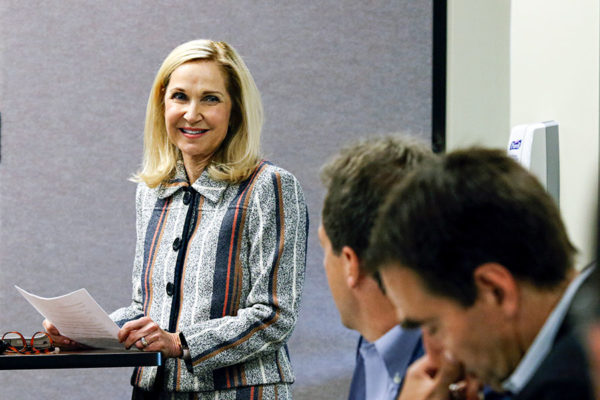Before rooting out the most sprawling case of health care fraud in state history, before beginning a two-year odyssey that touched off a federal investigation and resulted in a $24 million settlement between the U.S. Department of Justice and Northwest Montana’s largest medical provider, before his status as “the whistleblower” terminated his career and cast his reputation into the spotlight, before all of that, Jon Mohatt made a promise.
A career military officer, Mohatt met and married an Army nurse from Kalispell in 1994 while working as a health care administrator at a medical center in Tacoma, Washington, a job that spring-boarded him into a career overseeing sweeping medical operations at military bases all over the country. When the couple began having children, he transitioned from the Army to the U.S. Air Force and continued on an ambitious trajectory that would see his family move 10 times in two decades, him working in executive leadership roles and she as a nurse.
For Mohatt, the journey was worth it, each new job and every transition bringing him one step closer to fulfilling his promise.
He made the promise to his wife, Courtney, a Kalispell native and Flathead High School graduate who wanted nothing more than to return to her hometown one day and settle into the familiar rhythm of a Montana lifestyle. Both Jon and Courtney joined the military to pay down college debt, but it was a strong fit for Mohatt, whose father worked as a senior special agent with the U.S. Department of Agriculture, a career path his brother would follow as well.
“I grew up in a household that forged my values,” Mohatt said. “The military just hardened them.”
So when, after 26 years in the military, including 22 years of active duty, he became eligible for retirement, he made good on his promise. As fate would have it, Kalispell’s rapidly expanding health care market was advertising for a position right in Mohatt’s wheelhouse, and he leveraged his leadership experience to step into a new role as the Chief Financial Officer of Kalispell Regional Healthcare’s physician network, while the hospital hired Courtney as an emergency room nurse.
Editor’s Club Exclusive (link): Mohatt in his own words
Not an Editor’s Club member yet? Here’s what you’re missing:

He submitted his retirement paperwork, and within four months the Mohatts and their three daughters had settled back in the Flathead Valley, with Jon driving two days straight from northern Virginia so he could begin work on Monday, April 14, 2014.
“I was extremely excited to be achieving our goal,” he said. “We came back thinking we had just fulfilled our lifelong dream and I had upheld my promise to get my wife home. That was the arrangement. You come back thinking you are going to have the best years of your life and it has been a pretty tumultuous few years. But through it all I am here to set the example for my kids.”
The tumult Mohatt is referring to stems from a complaint he brought in 2016 alleging Kalispell Regional Healthcare paid its physicians at above-market rates to incentivize referrals within the system, an alleged scheme that enriched senior executives and specialist physicians. The lawsuit was filed under the federal False Claims Act, considered the nation’s foremost whistleblower law. A second lawsuit was filed in April alleging additional violations of the same federal law. Both were resolved when the hospital agreed to a $24 million settlement with the Department of Justice. In addition to the monetary settlement, the hospital, which continues to dispute the allegations, must also enter into a mandatory compliance program.
During the course of its investigation, the government alleged that 63 physicians were involved.
Read the entire 91-page complaint>>>
Read the entire 67-page complaint>>>
As chief financial officer of the physician network, Mohatt managed the financial operations for more than 46 medical practices consisting of more than 220 medical providers and $100 million in net revenues. In overseeing the financial operations of the physician clinics, Mohatt compiled detailed physician compensation and production data, which is how he came to learn of major financial losses due to excessive physician compensations, including $15.9 million in fiscal year 2014, $18.8 million in 2015 and $22.8 million in 2016, according to the complaint.
When all clinic overhead costs are included, the estimated losses exceeded $100 million in the last five years, the complaint states.
Meanwhile, according to the complaint, a subset of employed physicians generated collections of $60.3 million, yet Kalispell Regional paid them $91.8 million.
Mohatt and his attorney in the case, Bryan Vroon, agreed to an interview with the Beacon on the stipulation that he not discuss specifics in the lawsuit, which are detailed in the nearly 100-page complaint.
The settlement resolves allegations under the qui tam provisions of the False Claims Act, which allow private parties like Mohatt to bring suit on behalf of the government and share in any recovery.
Mohatt will receive $5,411,521 as his share of the recovery, which the hospital must pay out over a six-year period.
Even though Mohatt insists he did right by shining light on the allegations, he acknowledges it has been a trying time, both for him and his family, including Courtney, who continues to work for the hospital. The support the family has received from throughout the community, the Mohatts say, has at times been undermined by criticism and accusations of financial motives, both at their daughters’ school and at the workplace.
“If people knew the kind of person Jon is, if they understood his background, they would know that he did this for the right reasons,” Courtney Mohatt said at their Kalispell home.
For Jon Mohatt, stepping into the spotlight as a whistleblower meant giving up his career as a health administrator, a position he left under mutually agreeable terms with the hospital. In order to continue in a similar position, he would have to relocate, foregoing the promise he made to his wife.
“For anyone that has the fantasy that this is an easy process to go through, it is extremely difficult,” he said. “It’s difficult on your family, difficult on your kids. If you don’t have a strong family in place, something like this could literally rip them apart. There is a sacrifice in doing the right thing, which is why a lot of people look the other way. They don’t want to make the sacrifice. But I grew up in a career where I sacrificed all the time. You and your family make sacrifices all the time in the military, so it becomes something that you are accustomed to. I will sacrifice every day of the week if it means upholding my integrity.”
“I no longer get to work with my wife, which was our lifelong intent,” he continued. “You don’t go into something like this with any financial incentive because what it cost me was far more valuable. We would have had to move for me to continue to work in health care administration. I had to change careers. There has been a lot of sacrifice.”

Since leaving Kalispell Regional, Mohatt, who turned 50 years old on Oct. 3, has started a new career in realty with Glacier Park Realty — not because he needs the money, he says, but because he enjoys working in a community he cherishes.
“Ask yourself how many people want to shift careers at 50 years old? This wasn’t without sacrifice,” he said. “But I was willing to make the sacrifice because I would rather right a wrong than look the other way. I was financially independent. I have a military retirement. We are debt free. We could have retired and sat on the beach. But that is not us. We want to contribute to the community.”
Mohatt said he intends to donate portions of the settlement to various nonprofits in the Flathead Valley, including the family’s church, Big Brother Big Sister and Sparrow’s Nest.
“We are blessed to be able to give back,” he said.
The six-count lawsuit centers on alleged violations of the Anti-Kickback Statute, a criminal law prohibiting financial arrangements between doctors and hospitals or other health care providers or companies, and the civil Stark statute, a federal physician self-referral law designed to prevent financial incentives for physicians to steer patients to particular providers from whom they stand to reap benefits.
The Anti-Kickback Statute prohibits offering, paying, soliciting, or receiving remuneration to induce referrals of items or services covered by Medicare, Medicaid, and other federally funded programs. Both the Anti-Kickback Statute and the Stark Law are intended to ensure that a physician’s medical judgment is not compromised by improper financial incentives and is instead based only on the best interests of the patient.
On the heels of the settlement, KRH President and CEO Pamela Robertson expressed relief and an eagerness to move forward. Last month, Robertson announced she was resigning from her position for personal reasons, effective Nov. 30.
Because the complaint was filed in 2016, the allegations stem from former KRH President and CEO Velinda Stevens’ tenure, before Robertson took over last October. Stevens died in January 2017.
According to Robertson, the competitive compensation doled out to physicians “attracts the caliber of talent to this area that we believe the people of Northwest Montana deserve.”

Rick Robinson, a Washington, D.C.-based attorney who represented KRH throughout the government’s investigation, said the hospital’s goal to evolve into a regional medical destination could not have been achieved without recruiting high-caliber physicians, which costs money.
Moving forward, William Gibson, the hospital’s general counsel, said the hospital will continue to review physicians’ employment arrangements to determine “what is best for the organization,” and is taking steps to hire a full-time compliance officer. Up until now, the hospital did not employ a full-time compliance officer, but rather assigned those duties to another staff member.
In finalizing the settlement, KRH will implement a Corporate Integrity Agreement (CIA), which is commonplace in such lawsuits. The agreement outlines the elements of the organization’s compliance program and processes for demonstrating adherence to those obligations.
James Alderson, a former chief financial officer at North Valley Hospital, was the whistleblower in a health care fraud case perpetrated by Quorum Health Care, the company that managed North Valley for a period beginning in 1990, among other hospitals nationwide, and which Alderson alleged created fraudulent cost reports.
The case came to a close in 2001, with Quorum paying back $85.7 million under the federal whistleblower law, including $20.6 million to Alderson. In addition to the monetary payout, Alderson said the hospital signed a corporate integrity agreement to ensure legal compliance, a requirement he said ensures justice.
“The financial side is going to be a relatively small part of the settlement,” Alderson, who now lives in California, said. “If they are going to follow the law and pay the doctors the way they are supposed to, that is going to represent a fundamental change in their business. These are very tough documents.”
Failure to comply with a CIA can result in financial penalties and potentially exclusion from federal health care programs.
Mohatt said his motive in taking his case public was always born of an interest in seeing the community’s health care organization operate as efficiently and effectively as possible, and to “go from good to great.”
“I have never had any intent other than to improve the community’s health organization. When I got hired I dedicated myself to the health care system like I did to the military. That’s just how I am wired,” he said. “I fought for the employees and fair wages. Everything I did was to improve KRH. And that is still what I want to see more than anything else.”
“We are blessed to have the services that we do,” he said.
